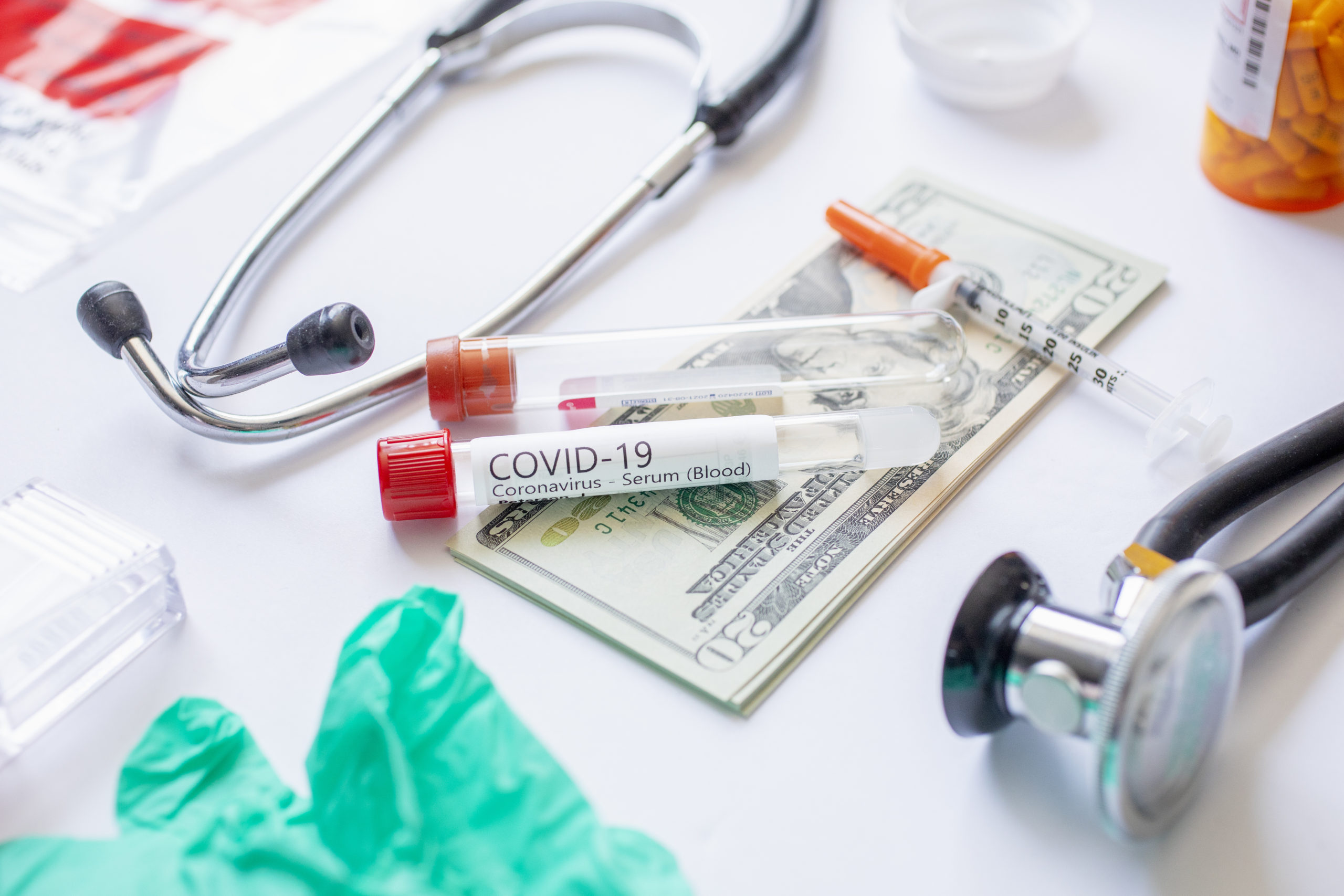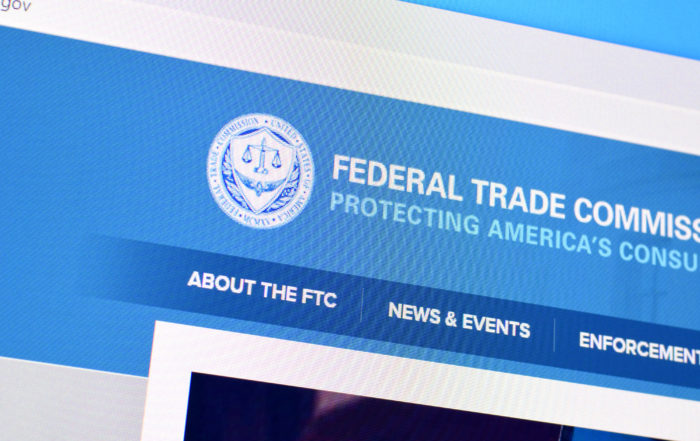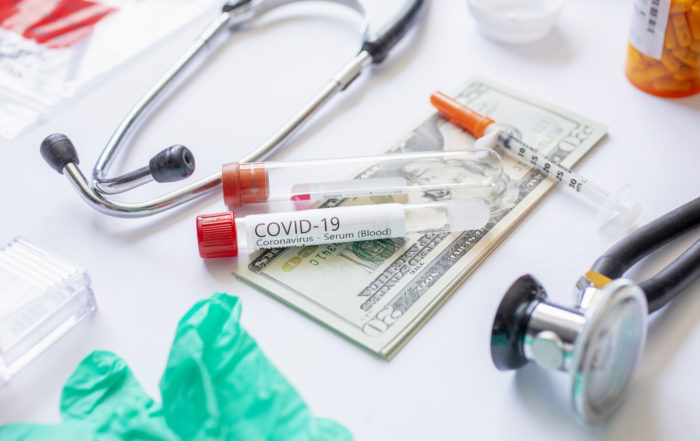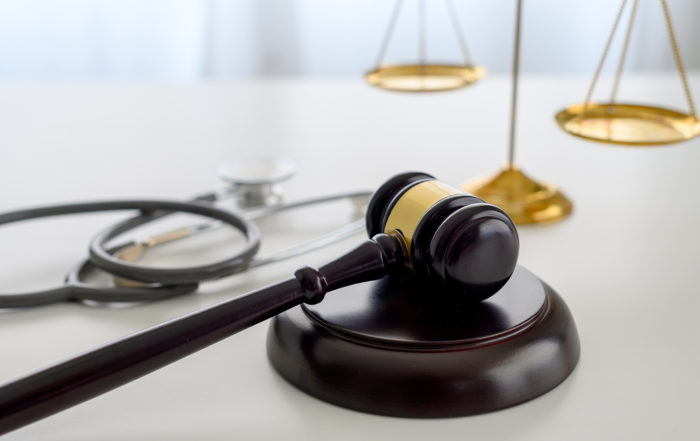
Keeping Track of the Quacks: Drug and Device Enforcement in the COVID-19 Era
By Beth Weinman, Josh Oyster, and Meighan Parker
Introduction
In February 2020, the Secretary of the Department of Health and Human Services (HHS) declared a public health emergency involving the virus that causes COVID-19.[1] Unfortunately, the public health emergency has provided seemingly fertile ground for nefarious characters to prey upon mass uncertainty and consumer fear for their own personal gain. To protect consumers from fraudulent medical products during the COVID-19 pandemic, the U.S. Food and Drug Administration (FDA) launched “Operation Quack Hack.”[2] Similarly, the Department of Justice (DOJ) has prioritized the investigation and prosecution of fraudulent or otherwise unfair practices related to COVID-19.[3] DOJ has established hotlines for reporting COVID-19 fraud as well as hoarding and price-gouging.[4] The government has sought injunctions and even brought criminal charges against defendants seeking to exploit the public health emergency by touting unapproved and sometimes dangerous drugs promising to prevent or cure COVID-19 or selling fraudulently labeled personal protective equipment (PPE). Additionally, FDA, often in conjunction with the Federal Trade Commission (FTC), has issued more than 100 warning letters for products intended for COVID-19 uses.
To date, enforcement actions related to COVID-19 have primarily involved allegations of egregious violations of the Federal Food, Drug and Cosmetic Act (FDCA) or federal mail and wire fraud statutes where “quackery” may be a particularly apt description of the alleged conduct. However, we expect that at some point the government will pivot towards cases involving subtler theories of potential deception or failures to comply with applicable regulatory requirements. This article reviews key COVID-19-related DOJ and FDA enforcement actions to date, makes predictions regarding what the next wave of federal government enforcement may look like, and recommends best practices for ensuring compliance with FDA requirements for the duration of the pandemic and beyond.
Overview of DOJ and FDA Enforcement Actions During COVID-19
Since the start of the pandemic, FDA and DOJ have used a range of regulatory and judicial tools to stop the distribution of false COVID cures and other defective and mislabeled products, warn consumers about them, and try to deter future misconduct.
Regulatory Enforcement
As of August 26, 2020, FDA has issued 111 warning letters—eighty jointly with the FTC—to companies involved in the marketing of unapproved products for uses related to COVID-19, the vast majority making drug claims. Products highlighted in the COVID-19 warning letters include, among others, essential oils, colloidal silver, teas, and dietary supplements marketed with claims to prevent, treat, mitigate, or cure COVID-19. With respect to devices, FDA has issued three warning letters related to the marketing of unapproved COVID-19 antibody tests for at-home use.[5]
While warning letters typically request a response from firms within fifteen business days, FDA’s warning letters related to COVID-19 have generally insisted on responses within forty-eight hours of receipt. This accelerated timeline for responses describing a firm’s corrective actions demonstrates the urgency with which FDA is acting to ensure that firms remove unapproved products from the market promptly.
FDA has also used its public perch to issue safety alerts warning the public against the use of certain unapproved, potentially dangerous products. For example, FDA warned against the use of hand sanitizer products containing wood alcohol following reports of adverse events including blindness, hospitalizations, and death. FDA recommended that numerous firms recall these products and also added foreign makers of such products to an import alert to prevent the products from entering the U.S.[6]
Judicial Enforcement
As summarized in the table below, DOJ has filed eight civil injunction actions and eleven criminal actions relating to alleged violations of the FDCA or otherwise fraudulent marketing of products intended for uses related to COVID-19.[7]
|
Case Type[8] |
Count |
Specific Cases |
|
Civil Injunction (FDCA) |
2 |
|
|
Civil Injunction (Mail and/or Wire Fraud[9]) |
6 |
|
|
Criminal (FDCA) |
10 |
|
|
Criminal (Mail and/or Wire Fraud Only) |
1 |
|
Several cases involving particularly brazen allegations are described below.
Genesis II Church of Health and Healing (Genesis II)
In April 2020, FDA sent a warning letter to Genesis II relating to its marketing of “Miracle Mineral Solution” (MMS) as a treatment for COVID-19 and other conditions. MMS is an oral solution that converts to a hazardous bleach product when combined with an activator. FDA had previously warned consumers in August 2019 about the potentially life-threatening effects of MMS, including severe vomiting, dehydration, and acute liver failure.[10]
After Genesis II refused to cease distribution of MMS following the April 2020 warning letter, DOJ sought an injunction under the FDCA against Genesis II and its founders, the Grenon family. DOJ alleged that the MMS sold by the defendants was an unapproved new drug that had false and misleading labeling.[11] The district court for the Southern District of Florida enjoined the defendants from, among other things, selling an unapproved or misbranded drug like MMS.[12]
Genesis II and the Grenon family refused to comply with the court order, claiming, among other things, that the government has no authority over their “church.”[13] Consequently, the defendants were charged criminally in the same court with conspiracy to introduce a misbranded drug into interstate commerce and to defraud the U.S. government, and with criminal contempt for willfully violating the injunction.[14] The criminal complaint also explained that the defendants had informed the judge presiding over the civil case that they would not comply with the court’s injunction and had threatened violence.[15] Two weeks after the criminal charges were filed, Genesis II filed a civil lawsuit in federal court in Maine against DOJ and FDA, claiming, among other things, “trespass against rights with intent” and unlawful seizure and deprivation of “God-given unalienable rights” and rights afforded under various sections of the U.S. Constitution.[16]
Though the outcome of the criminal case—and the follow-on civil lawsuit by Genesis II—remains to be seen, the allegations outlined in the civil injunction and criminal case may help explain why FDA’s COVID-19 enforcement initiative is named “Operation Quack Hack.” The cases also demonstrate that the government is directing resources to matters that involve allegations of both significant fraud and significant harm.
Crawford Technology and King Year Printing and Packaging
DOJ has also filed criminal charges against entities involved in the manufacture, promotion, and distribution of misbranded and adulterated filtering facepiece respirators (FFRs). In separate criminal complaints, two Chinese companies, Crawford Technology Group (HK) Co., Ltd. (Crawford) and King Year Printing and Packaging Co., Ltd. (King Year), were charged with violating the FDCA by introducing misbranded and substandard FFRs into interstate commence.[17]
According to the criminal complaint against Crawford, the firm allegedly manufactured and shipped 140,400 misbranded and adulterated KN95 respirators to the United States.[18] The packaging of those respirators represented that the devices had a 95% filtration efficiency and were compliant with the regulatory standards for respirators in the European Union and China.[19] However, the respirators allegedly did not meet the applicable filtration standard when tested and were, in fact, significantly below the required thresholds, rendering their labeling false and misleading.[20]
Similarly, a second manufacturer, King Year, allegedly imported approximately 500,000 respirators with “N95” markings and product labeling that included a test report falsely showing compliance with the N95 filtration standard when testing conducted by the government established that the masks did not meet this standard.[21] DOJ also charged King Year with making false statements by filing a false registration document with FDA claiming that the respirators were “NIOSH-approved N95 respirators” and by utilizing a fictitious corporation as its U.S. agent in those registration documents.[22]
A Wall Street Journal analysis found that King Year and Crawford, in addition to approximately 1,300 other Chinese entities, allegedly named the same fabricated entity, with a false address, as the U.S. agent in their respective FDA registration statements.[23] This issue potentially raises concerns about whether those companies are falsifying other information in their registration documents and whether they are also selling PPE or other products that fail to meet the quality and efficacy standards on their labeling.
Huu Tieu
Huu Tieu, the president and chief executive officer of Golden Sunrise Pharmaceutical Inc. and Golden Sunrise Nutraceutical Inc., was indicted in July 2020 for allegedly committing mail fraud and introducing a drug into interstate commerce that was misbranded because it fraudulently promoted the drug for the treatment of a variety of medical conditions, including COVID-19.[24] He allegedly claimed that one of the mixtures, referred to as “ImunStem,” was the first dietary supplement to gain FDA approval as a prescription drug to treat HIV, cancer, and COVID-19.[25] Tieu also allegedly claimed that ImunStem was designated as a Regenerative Medicine Advanced Therapy (RMAT), which would have required that it be a cellular therapy.[26] Neither of these claims were true, though Tieu allegedly sought reimbursement for ImunStem from insurers as a cellular therapy.[27] The easily demonstrable falsity of Tieu’s affirmative misrepresentations about the FDA regulatory status of his products, and the allegation that Tieu defrauded not only consumers but also insurers, may have made Tieu an attractive target for prosecution.
As shown in these cases, the government is moving quickly to deliver on its promise to take COVID-19-related fraud seriously and to protect consumers from “quack” products. From issuing warning letters to filing civil and criminal complaints, FDA and its law enforcement partners have pursued pandemic-related drug and device enforcement with vigor, even while juggling numerous other competing interests.
The Next Wave of DOJ and FDA Enforcement
Because the COVID-19 public health emergency is unlikely to resolve quickly, and conduct involving both obvious deception and medical products that pose a great risk of harm are both compelling and relatively easy to prove, the government will likely continue to prioritize enforcement in this area. Presumably, however, government attorneys will eventually move beyond conduct that could be considered “low-hanging fruit” and will turn to more complicated cases. Future enforcement may target noncompliance with FDA emergency use authorizations (EUAs) or enforcement discretion policies by new industry entrants with immature compliance programs or veteran entities that let their guard down as they try to speed products to market. Through the False Claims Act (FCA), the government will also likely seek to recover federal dollars paid for misleadingly labeled or otherwise defective or non-compliant medical products.
Continued Focus on Sham Treatments and Other Unapproved Products
As the U.S. experiences another spike in COVID-19 cases, there may be a corresponding surge in the marketing of unapproved products for COVID-19. FDA will likely target false or misleading product claims by actively monitoring physical locations of retail stores, social media pages, and online marketplaces for companies that are advertising and peddling fraudulent COVID-19 products.[28] The agency has consistently reiterated that there are currently no drugs to treat or vaccines to treat or prevent COVID-19 approved in the United States, although FDA has to date issued five EUAs for drug products used in the treatment of COVID-19, including one for the investigational antiviral drug remdesivir and another for convalescent plasma.[29] Moreover, FDA has still not authorized any diagnostic tests for complete use and processing at home.
Material Noncompliance by “New” Entrants to FDA Regulation
FDA has issued many enforcement discretion policies and granted dozens of EUAs for drugs and devices in an attempt to mitigate product shortages and spur the development of new products and treatments for COVID-19. FDA has issued EUAs for a wide range of products, including diagnostic tests, PPE, ventilators, and drugs used in the treatment of patients with COVID-19. These EUAs enable the products subject to them to be distributed legally during the pendency of the emergency, so long as the conditions in the EUA letter are met. Similarly, FDA’s enforcement discretion policies have addressed a wide range of products and permitted the marketing of these products, pursuant to enforcement discretion, under specified conditions during the public health emergency.[30]
While traditional drug and medical device companies are familiar with FDA requirements and the responsibility to ensure regulatory compliance, firms seeking EUAs or marketing products under FDA’s enforcement discretion policies may be “new” to FDA regulation and unfamiliar with the complex requirements that may apply to marketing an FDA-regulated product. For example, shortages of face masks, ventilators, hand sanitizers, and various other products have spurred new market entrants in those areas. These new entrants may lack a regulatory compliance infrastructure with appropriate controls to satisfy applicable requirements. While EUAs and enforcement discretion policies typically relax certain FDA requirements, they do not waive compliance with all requirements. Firms need to understand which requirements continue to apply to the products they are marketing.
These requirements include, among others, adverse event reporting, labeling requirements, restrictions on advertising and promotion, and, potentially, compliance with current good manufacturing practices (cGMP). Importantly, no current EUAs and none of FDA’s COVID‑19 enforcement policies waive applicable adverse event reporting requirements, so firms must ensure they have processes in place to receive, process, and report adverse events as appropriate for a given product type. Additionally, EUA limitations on advertising and promotion include ensuring promotional materials are consistent with the authorized labeling, the authorized intended uses, and contain no representations of safety or efficacy. Such products should also not be marketed as approved or cleared by FDA. Firms must carefully review any and all promotional materials for their products to ensure they do not trip the limitations in the applicable EUA or enforcement discretion policies and do not otherwise violate the FDCA.[31]
Notably, some EUAs waive compliance with applicable cGMP requirements (e.g., the quality system regulation for medical devices). For example, the EUAs for ventilators and certain related accessories, as well as serology and molecular diagnostic tests, tend to exempt manufacturers from specific quality system requirements with respect to the design, manufacture, packaging, labeling, storage, and distribution of the authorized products in accordance with the EUA.[32] On the other hand, the current EUAs for drug products do not waive cGMP requirements.
Looking ahead, the government is likely to scrutinize whether firms marketing products under EUAs or enforcement discretion policies are adhering to applicable requirements, particularly in any cases where such products are suspected of causing patient harm (e.g., hand sanitizer products containing wood alcohol). Nonetheless, the government is unlikely to pursue enforcement action for mere technical violations of applicable requirements. A senior DOJ official recently explained in public remarks that DOJ’s enforcement efforts would be “consistent with the increased regulatory flexibility afforded to companies developing and distributing COVID-19 tests, treatments, and protective equipment.”[33] The official added: “When a company seeks in good faith to operate within this regulatory framework, it should not have to fear first learning of government disapproval through a civil or criminal action.”[34]
Provision of Non-Conforming or Non-FDCA-Compliant Products Under Government Contracts
To mitigate COVID-19-related product shortages, federal agencies awarded many government contracts to private entities to increase the availability of PPE and testing supplies.[35] However, according to a recent letter from the House of Representatives Select Subcommittee on the Coronavirus Crisis to administration officials, the government awarded many of these contracts to newly formed entities that had never previously been awarded a government contract.[36] In certain cases, these contractors allegedly either failed to provide the promised supplies altogether or supplied low-quality products that materially differed from the products promised.[37] For example, one entity received a $10 million contract from FEMA to supply test tubes and swabs used in COVID-19 diagnostic testing. Instead of supplying standard tubes typically used by laboratories, the contractor allegedly supplied tubes of an unsuitable size that were manufactured in a dirty facility using non-cGMP-compliant methods and that may have been contaminated.[38] It would not be surprising if the recent letter from the House Select Subcommittee and the news reports upon which it was based triggered comprehensive investigations into potential violations of the FCA, FDCA, and other applicable legal requirements.
Compliance Best Practices
As the COVID-19 pandemic continues, government enforcement priorities are likely to evolve and expand, as we have described in this article. Firms marketing products used to help treat, diagnose, cure, prevent, or mitigate COVID-19 under EUAs or FDA enforcement discretion policies—especially firms that have never previously marketed an FDA-regulated product—can take the following actions now to reduce the risk of future government scrutiny:
- Stay current regarding the terms of EUAs and enforcement discretion policies applicable to the firm’s products, as FDA has revised numerous EUAs and policies since their original issuance. A number of EUAs and policies have also been revoked, technically rendering illegal products that at one point were permitted to be distributed without objection by FDA.
- Ensure documented processes and qualified personnel are in place to monitor compliance with the particular regulatory requirements (e.g., adverse event reporting, labeling, advertising and promotion) that apply to the firm’s products.
- Promptly investigate and address any adverse event reports or product quality complaints, including by reporting those required by law to be reported to FDA. Reports of patient harm or product defects are a common basis for the initiation of DOJ and FDA investigations.
- If the firm wishes to continue marketing its products after the COVID-19 pandemic, plan ahead for the traditional marketing authorization pathway that would apply to the firm’s products if and when EUAs are terminated and FDA’s enforcement discretion policies are rescinded following the conclusion of the public health emergency.
While we cannot predict with any degree of certainty when the COVID-19 pandemic will end, we are confident that DOJ and FDA will continue to prioritize enforcement against actors they view as illegally capitalizing on pandemic profit-making opportunities at the public’s expense. Drug and device makers can best protect themselves from unwanted government scrutiny during these unprecedented times by keeping abreast of regulatory and policy changes, prioritizing transparency, and making sure to commit the necessary resources to their compliance functions.
[1] 85 Fed. Reg. 7,316 (Feb. 7, 2020).
[2] Judy McMeekin & Anand Shah, “FDA Protects Patients and Consumers from Fraud During COVID-19” (July 20, 2020), available at https://www.fda.gov/news-events/fda-voices/fda-protects-patients-and-consumers-fraud-during-covid-19.
[3] DOJ, “Principal Deputy Assistant Attorney General Ethan P. Davis delivers remarks on the False Claims Act at the U.S. Chamber of Commerce’s Institute for Legal Reform” (June 26, 2020), available at https://www.justice.gov/civil/speech/principal-deputy-assistant-attorney-general-ethan-p-davis-delivers-remarks-false-claims.
[4] See DOJ’s Coronavirus Response webpage at https://www.justice.gov/coronavirus.
[5] FDA, “Coronavirus (COVID-19) Update: FDA Issues Warning Letters to Companies Inappropriately Marketing Antibody Tests, Potentially Placing Public Health at Risk” (June 17, 2020), available at https://www.fda.gov/news-events/press-announcements/coronavirus-covid-19-update-fda-issues-warning-letters-companies-inappropriately-marketing-antibody.
[6] FDA, “Coronavirus (COVID-19) Update: FDA Reiterates Warning About Dangerous Alcohol-Based Hand Sanitizers Containing Methanol, Takes Additional Action to Address Concerning Products” (July 27, 2020), available at https://www.fda.gov/news-events/press-announcements/coronavirus-covid-19-update-fda-reiterates-warning-about-dangerous-alcohol-based-hand-sanitizers.
[7] Notably, six of the injunctive actions and one of the criminal cases were brought under federal mail and wire fraud statutes instead of the FDCA. Though these cases have generally involved allegations of fraudulent marketing of products to treat or prevent COVID-19 transmission that would have constituted violations of the FDCA, the government may have determined that the mail or wire fraud violations would be easier to explain and prove. In addition, in the criminal sphere, DOJ often pursues mail and wire fraud violations because convictions will lead to greater jail time than permitted under the FDCA, which offers a maximum of three years for a felony violation of the Act.
[8] Information current as of August 26, 2020.
[9] 18 U.S.C. § 1345.
[10] FDA, “FDA Warns Consumers about the Dangerous and Potentially Life Threatening Side Effects of Miracle Mineral Solution” (Aug. 12, 2019), available at https://www.fda.gov/news-events/press-announcements/fda-warns-consumers-about-dangerous-and-potentially-life-threatening-side-effects-miracle-mineral.
[11] DOJ, “Justice Department Seeks to End Illegal Online Sale of Industrial Bleach Marketed as “Miracle” Treatment for COVID-19” (Apr. 17, 2020), available at https://www.justice.gov/opa/pr/justice-department-seeks-end-illegal-online-sale-industrial-bleach-marketed-miracle-treatment.
[12] See Order of Perm. Injunction, United States v. Genesis II Church of Health & Healing, No. 20-cv-21601 (S.D. Fla. July 9, 2020); Order of Perm. Injunction, United States v. Genesis II Church of Health & Healing, No. 20-cv-21601 (S.D. Fla. Aug. 3, 2020).
[13] See Criminal Complaint, United States v. Grenon, No. 20-mj-03050 (S.D. Fla. June 30, 2020).
[14] DOJ, “Father and Sons Charged in Miami Federal Court with Selling Toxic Bleach as Fake ‘Miracle’ Cure for Covid-19 and Violating Court Orders” (July 8, 2020), available at https://www.justice.gov/usao-sdfl/pr/father-and-sons-charged-miami-federal-court-selling-toxic-bleach-fake-miracle-cure.
[15] See Criminal Complaint, United States v. Grenon, No. 20-mj-03050 (S.D. Fla. June 30, 2020).
[16] See Civil Complaint, Genesis II Church of Health & Healing v. DOJ, No. 20-cv-00253 (D. Me. July 20, 2020).
[17] DOJ, “Chinese Manufacturer Charged with Exporting Defective and Misbranded Masks Falsely Purporting to be KN95 Respirators” (June 18, 2020), available at https://www.justice.gov/usao-nj/pr/chinese-manufacturer-charged-exporting-defective-and-misbranded-masks-falsely-purporting; DOJ, “Chinese Manufacturer Charged with Exporting Misbranded and Defective Masks Falsely Purporting to be N95 Respirators” (June 5, 2020), available at https://www.justice.gov/usao-nj/pr/chinese-manufacturer-charged-exporting-misbranded-and-defective-masks-falsely-purporting.
[18] See Criminal Complaint, United States v. Crawford Technology (HK) Co., Ltd., No. 20-mj-15272 (D.N.J. June 17, 2020).
[19] Id.
[20] Id. at 12–13.
[21] See Criminal Complaint, United States v. King Year Printing and Packaging Co., Ltd., No. 20-mj-00416 (E.D.N.Y. June 5, 2020).
[22] Id.
[23] See Austen Hufford et al., “Over 1,300 Chinese Medical Suppliers to U.S.—Including Mask Providers—Use Bogus Registration Data” (June 12, 2020), available at https://www.wsj.com/articles/over-1-300-chinese-medical-suppliers-to-u-s-including-mask-providersuse-bogus-registration-data-11591991270.
[24] DOJ, “Tulare County Man Indicted for Falsely Marketing Herbal Mixtures as FDA-Approved Treatment for COVID-19” (July 14, 2020), available at https://www.justice.gov/usao-edca/pr/tulare-county-man-indicted-falsely-marketing-herbal-mixtures-fda-approved-treatment.
[25] See Indictment at 8–10, United States v. Tieu, No. 20-cr-00109 (E.D. Cal. July 9, 2020).
[26] Id.
[27] Id.
[28] FDA, “Beware of Fraudulent Coronavirus Tests, Vaccines and Treatments” (last visited July 29, 2020), available at https://www.fda.gov/consumers/consumer-updates/beware-fraudulent-coronavirus-tests-vaccines-and-treatments.
[29] See, e.g., FDA, “Emergency Use Authorization for Remdesivir” (May 1, 2020), available at https://www.fda.gov/media/137564/download; “Emergency Use Authorization for COVID-19 Convalescent Plasma” (Aug. 23, 2020), available at https://www.fda.gov/media/141477/download.
[30] On August 19, 2020, the Department of Health and Human Services posted a surprise announcement that effectively precludes FDA from requiring EUAs for laboratory developed tests (LDTs), during the COVID-19 emergency or thereafter, without notice and comment rulemaking. FDA’s previously issued policy regarding COVID-19 testing laid out FDA’s expectation that diagnostic (as opposed to antibody detecting) LDTs would require EUAs, though testing could commence pursuant to enforcement discretion prior to receipt of an EUA so long as FDA was notified of successful test validation, and an EUA request was submitted within fifteen days of notification. See Policy for Coronavirus Disease-2019 Tests During the Public Health Emergency (Revised) (May 11, 2020), available at https://www.fda.gov/media/135659/download (last visited August 27, 2020). While this announcement will make it very difficult for FDA to take enforcement action against a laboratory for failing to seek an EUA for a COVID-19 diagnostic LDT in compliance with FDA’s COVID-19 testing policy, false and misleading labeling and promotional claims will continue to be fair game for FDA, FTC, and DOJ under applicable consumer protection and fraud statutes.
[31] Id.; see also FDA, “Emergency Use Authorization for SARS-CoV-2 RNA DETECTR Assay” (July 9, 2020), available at https://www.fda.gov/media/139934/download.
[32] See, e.g., FDA, “EUA Letter of Authorization—Ventilators, anesthesia gas machines modified for use as ventilators, and positive pressure breathing devices modified for use as ventilators (collectively referred to as ‘ventilators’), ventilator tubing connectors, and ventilator accessories” (Mar. 24, 2020), available at https://www.fda.gov/media/136423/download; FDA, “Emergency Use Authorization for Novel Coronavirus (SARS-CoV-2) Fast Nucleic Acid Detection Kit (PCR-Fluorescence Probing)” (July 24, 2020), available at https://www.fda.gov/media/140426/download; FDA, “Emergency Use Authorization for Helix COVID-19 Test” (July 23, 2020), available at https://www.fda.gov/media/140422/download.
[33] DOJ, “Principal Deputy Assistant Attorney General Ethan P. Davis delivers remarks on the False Claims Act at the U.S. Chamber of Commerce’s Institute for Legal Reform” (June 26, 2020), available at https://www.justice.gov/civil/speech/principal-deputy-assistant-attorney-general-ethan-p-davis-delivers-remarks-false-claims.
[34] Id.
[35] Letter from House of Representatives Select Subcommittee on the Coronavirus Crisis to Alex M. Azar II (July 14, 2020), available at https://coronavirus.house.gov/sites/democrats.coronavirus.house.gov/files/2020-07-14.Select%20Cmte.%20to%20Azar-HHS%20Esper-DOD%20Wolf-DHS%20Wilkie-%20VA%20re%20Administration%20PPE%20Contractor%20%281%29.pdf.
[36] Id.
[37] Id.
[38] Id. at 4. See also J. David McSwane & Ryan Gabrielson, “The Trump Administration Paid Millions for Test Tubes—and Got Unusable Mini Soda Bottles” (June 18, 2020), available at https://www.propublica.org/article/the-trump-administration-paid-millions-for-test-tubes-and-got-unusable-mini-soda-bottles.
Update Magazine
Fall 2020

 BETH WEINMAN is a member of Ropes & Gray’s life sciences regulatory and compliance practice group, and focuses her practice on FDA regulation and enforcement of laws governing pharmaceuticals, biologics, medical devices, and foods, including dietary supplements.
BETH WEINMAN is a member of Ropes & Gray’s life sciences regulatory and compliance practice group, and focuses her practice on FDA regulation and enforcement of laws governing pharmaceuticals, biologics, medical devices, and foods, including dietary supplements. MEIGHAN PARKER is an associate in Ropes & Gray’s life sciences & regulatory compliance group. She provides regulatory counsel on issues involving promotional compliance materials and regulatory risk management.
MEIGHAN PARKER is an associate in Ropes & Gray’s life sciences & regulatory compliance group. She provides regulatory counsel on issues involving promotional compliance materials and regulatory risk management.





